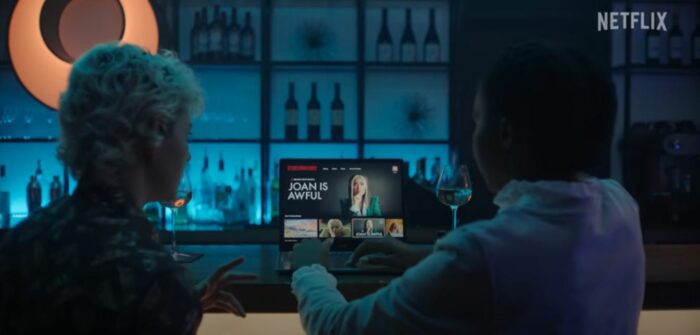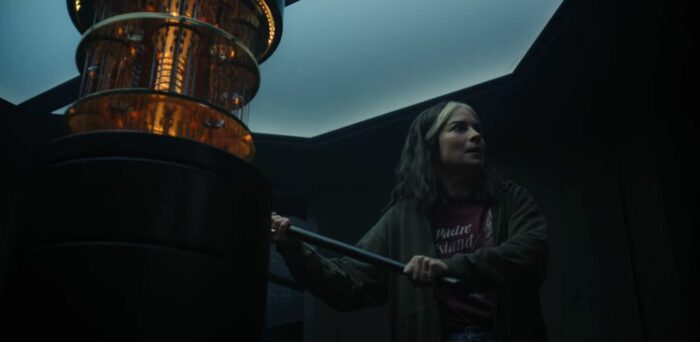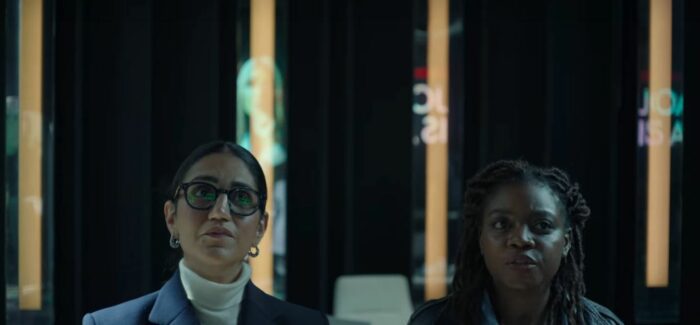The following recap and analysis contains spoilers for Black Mirror, “Joan Is Awful” (written by Charlie Brooker and directed by Ally Pankiw)
Let’s start with what’s least interesting about “Joan Is Awful” and the criticisms I have of this particular episode of Black Mirror, to get that out of the way so we can focus on what’s most worth thinking about.
The basic premise of “Joan Is Awful”—that Netflix Streamberry is making a show out of an ordinary woman’s life against her will—raises a couple of immediate questions about how they are doing this, and I have some quibbles.
On a legal level, “Joan Is Awful” spends some time hitting a point about people agreeing to terms, conditions, and contracts they did not actually bother to read, and certainly “Joan Is Awful” had to have this as a central element in its story, but frankly I think South Park did a better job exploring the issue 12 years ago in “HumancentiPad.”
What’s a little troubling is that Black Mirror seems to let the notion lie that if one merely read things and declined to agree to them, that might solve the problem. That thought is mined for humor in South Park because it’s ridiculous, but “Joan Is Awful” doesn’t really call it into question. And the point has to be that this kind of legalism must be destroyed, lest dystopia. Black Mirror fails to hit that note.
In fairness, the episode doesn’t endorse the idea that there is a solution within the existing system, either. It mostly just asks us to accept this aspect of social reality as something no one can do anything about. But what about the material production of the show?

Joan’s lawyer basically tells her that Streamberry is able to make “Joan Is Awful” because they’re surveilling her through her phone, but this is such an aside it would almost be better if the question weren’t addressed. Certainly no consideration is given to the possibility of chucking that phone in the river, or anything along those lines.
If we wanted to be charitable, we could read this as dark commentary in itself. Despite how bad it is for Joan to have her life made into a TV show against her will, she doesn’t even consider trying to unplug in a way that would deprive the streaming service of the material they need to feed their machine, and neither does anyone else suggest trying this.
It could be that other people’s phones are also being used to surveil Joan, along with whatever other computers and such she encounters in the world, and it could be that technology is so pervasive that escaping would feel functionally impossible, but “Joan Is Awful” prefers to not even attempt to explore this avenue. Maybe that’s a strength of the story, in that this could have taken over the whole hour, but I’m not actually charitable enough to swallow it. I’m just not sure if my lack of charity should be directed at the creators of “Joan Is Awful” or at the characters within it who really don’t try to disentangle themselves at the personal level that is putatively within their control.

Instead, Joan decides to house a ton of fast food with a laxative chaser before going to a church to defecate in the aisle during a wedding (and, if you missed it, there is a scene of the real Joan doing this intercut into the closing credits). She wants to get the attention of the actor portraying her, only to discover that this person also has no power to change anything. They aren’t even really acting; they’ve sold their digital likeness and the whole program is being created by a quantum computer.
I’ve started to tie myself in knots talking about this, so let’s address how “Joan Is Awful” ultimately informs us that we aren’t operating on the level of reality for most of the episode. It wasn’t really a matter of Joan (Annie Murphy) enlisting the help of Salma Hayek, though this is what we saw, but of Joan (Kayla Lorette) enlisting the help of Annie Murphy. The Annie Murphy version of Joan is a deepfake.

I’m not sure this level of the story quite makes sense. It does insofar as the show Joan Is Awful involves Joan discovering and watching a show called Joan Is Awful—that creates infinite iterations of Joans. So far so good. But it couldn’t actually be infinite because that would require an infinite number of digital likenesses for the machine to deploy, so it would make more sense if it looped back around and, say, Cate Blanchett’s Joan saw Annie Murphy’s Joan, or something like that.
More to the point, though, this aspect of “Joan Is Awful” feels more like a gimmick to make the episode feel meta than anything. Here we are watching “Joan Is Awful” wherein Joan watches Joan Is Awful wherein Joan watches Joan Is Awful… ad infinitum.
In terms of the narrative itself, it’s true that Mona Javadi (Leila Farzad) pleads with Joan that by destroying the quantum computer she’ll kill millions of virtual souls who think they’re real, but that plea doesn’t really land.
It doesn’t land for Joan, and it shouldn’t land for us.

Black Mirror has previously made hay from the idea that digital copies are nonetheless real persons. In particular, “USS Callister” makes this point rather forcefully, but it does so precisely because the virtual selves portrayed in the episode seem to possess real agency. So we might take that thought to other contexts, like that of “White Christmas,” and start to feel deeply uncomfortable.
But in contrast, “Joan Is Awful” completely undercuts the notion that the digital copies are distinct persons in its climactic scene. The Joan we’ve known has no choice but to destroy the computer because that’s what the real Joan has done, and the real question is how in the world the computer could have fabricated the Annie Murphy version of Joan quickly enough for her to exist through its destruction.
OK, so it’s a quantum computer and it’s magically fast. I don’t want to get caught up on that. Rather, what I want to suggest is that the strength of “Joan Is Awful” has nothing to do with the technology it depicts. The strength lies in its social commentary.
Mona tells Fatima (Danielle Vitalis) that Streamberry’s goal is to create an indefinitely large number of versions of “Joan Is Awful” to provide highly personalized content. In other words, “Joan Is Awful” isn’t the point; “Fatima Is Awful” is the point, along with all of these other variants. This would entail, of course, that it wouldn’t be everyone in the world watching the show about how awful you are; it would just be the people you know. But the effect is the same. Those you know form your world, and it’s cold comfort to think about strangers who aren’t watching.
And, yes, Mona says they tried more positive permutations, but they found that “Caemeron Is Awesome” just didn’t drive engagement in the same way. “Caemeron Is Awful” creates a feedback loop where I’m caught in my own insecurities, and trying to fight against that negative perception on the part of others merely reinforces it.
The spiral is all too predictable. All that’s necessary to make you awful is for Netflix to make a show saying you are.

And, of course, that’s not happening right now (or hopefully ever), but Black Mirror does present us here with an incisive critique of the social media age we live in. Because it’s the same thing. How we’re represented slips beyond our control, and whenever you see someone trying to fight against how they’ve been misrepresented, you can’t help but feel they’re making it worse. Yet you can’t look away. It’s like a trainwreck.
This is the most disquieting thing about “Joan Is Awful”—Mona is absolutely right. We have no interest in watching shows about how great we are. We have no interest in lifting each other up or in solidarity. Or if we do, it’s entirely on the margins or outside of the social media machine.
Joan smashes the quantum computer towards the end of “Joan Is Awful,” but if we think about it for a moment, we have to recognize the utter impotence of this gesture. Surely they’ll just build another one. So this act which claims to operate at the level of the real is actually nothing but symbolic. To truly change things we’d have to somehow disengage. We’d have to refuse them our attention.
Netflix is clearly confident that we won’t do any such thing, as they present an episode of Black Mirror on their platform that calls the ethicality of the platform itself into question. Mona Javadi serves as a stand-in for Bela Bajaria to such an extent that I was almost surprised they didn’t use her real name.

If you read Rachel Syme’s profile of Bajaria in The New Yorker from earlier this year, one thing that stands out is the extent to which she eschews the very idea of having taste. Indeed, the quantum computer deployed by Streamberry in “Joan Is Awful” would seem to be the apotheosis of Netflix’s actual vision for its future. The only metric is engagement, and if they can make content that drives engagement without employing writers, directors, or actors, so much the better.
It’s not for nothing that the word on the street seems to be that Netflix is particularly hesitant to come to terms with the WGA, who are on strike at the time of this writing. A sticking point seems to be in the potential use of AI, as already it would be possible to script content using ChatGPT and engage in deepfakery to make it seem like big-name actors are in the product.
This is already happening. It makes sense to worry that they’ll get better at it, but I think the real worry “Joan Is Awful” should get us thinking about is that it might not matter all that much. Here we have a show made from the life of an unexceptional woman. It doesn’t matter if it’s good; people watch it.
It’s all too easy to imagine Netflix saying, with a shrug, “Who are we to judge what people like?”

